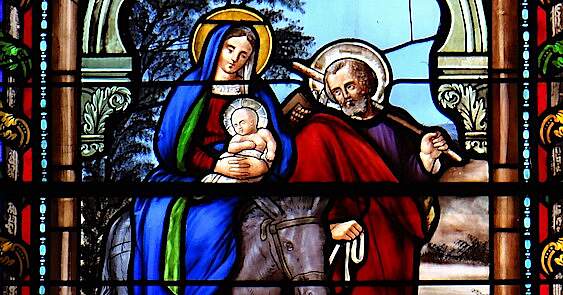
In Maria Valtorta's The Gospel as It Was Revealed to Me (1), the Blessed Virgin recalls how she and Joseph lived through the days of her early pregnancy before Joseph learned the truth from an angel:
“Who can truly tell Joseph's pain, his thoughts, the perturbation of his feelings? Like a little boat caught in a great storm, he was in a vortex of conflicting ideas, in a turmoil of reflections, of which one was more piercing and painful than the other. He was, to all appearances, a man betrayed by his wife. He saw his good reputation and the esteem of his world collapse around him; because of Her he saw scornful fingers pointed at himself and felt pitied by the village people. Above all, he perceived that his love and esteem for Me had fallen, struck to death, before the evidence of a deed.
In this respect, his holiness shines brighter than Mine. And I give this witness with the affection of a spouse, because I want you to love My Joseph, this wise, prudent, patient and good man, who is not separated from the mystery of Redemption, on the contrary, he is closely connected to it, because he suffered for it, consuming himself in sorrow for it, saving your Savior at the cost of his own sacrifice because of his holiness.
Had he not been so holy, he would have acted in a human way, denouncing Me as an adulteress so that I should be stoned, and the Son of My sin should perish with Me. If he had been less holy, God would not have granted him His light as guidance in his trial. But Joseph was holy. His pure spirit lived in God. His charity was ardent and strong. And out of charity he saved your Savior for you, both when he refrained from accusing Me to the elders, and when he saved Jesus in Egypt, leaving everything with prompt obedience.”
Maria Valtorta, The Gospel as Was Revealed to Me, Vol. 1, 25
(1) Maria Valtorta was a 20th-century visionary and victim soul, a Franciscan tertiary and a lay member of the Servants of Mary who wrote thousands of handwritten pages, without modification, recording events throughout Christ’s life. Together these visions are called the “Poem of the Man-God” – also known as “The Gospel as Was Revealed to Me”. Biblical scholars, through theological analysis, agree the writings are consistent with biblical teachings, and actually answer long-standing questions about biblical accounts